《工具录》nslookup
本文以 kali-linux-2023.3-vmware-amd64 为例。
1:nslookup
nslookup(name server lookup)常用于域名解析和网络故障排除。
nslookup 有两种操作模式,两种模式功能一致:
-
交互式模式
适用于在一个会话中执行多个查询或操作。 -
命令行模式(非交互模式)
适用于执行一次性的简单查询或将其嵌入到脚本中。
2:选项介绍
选项总览:man nslookup 命令中的解释。
NSLOOKUP(1) BIND 9 NSLOOKUP(1)
NAME
nslookup - query Internet name servers interactively
SYNOPSIS
nslookup [-option] [name | -] [server]
DESCRIPTION
nslookup is a program to query Internet domain name servers. nslookup
has two modes: interactive and non-interactive. Interactive mode al‐
lows the user to query name servers for information about various
hosts and domains or to print a list of hosts in a domain. Non-inter‐
active mode prints just the name and requested information for a host
or domain.
ARGUMENTS
Interactive mode is entered in the following cases:
a. when no arguments are given (the default name server is used);
b. when the first argument is a hyphen (-) and the second argument is
the host name or Internet address of a name server.
Non-interactive mode is used when the name or Internet address of the
host to be looked up is given as the first argument. The optional sec‐
ond argument specifies the host name or address of a name server.
Options can also be specified on the command line if they precede the
arguments and are prefixed with a hyphen. For example, to change the
default query type to host information, with an initial timeout of 10
seconds, type:
nslookup -query=hinfo -timeout=10
The -version option causes nslookup to print the version number and
immediately exit.
INTERACTIVE COMMANDS
host [server]
This command looks up information for host using the current
default server or using server, if specified. If host is an In‐
ternet address and the query type is A or PTR, the name of the
host is returned. If host is a name and does not have a trail‐
ing period (.), the search list is used to qualify the name.
To look up a host not in the current domain, append a period to
the name.
server domain | lserver domain
These commands change the default server to domain; lserver
uses the initial server to look up information about domain,
while server uses the current default server. If an authorita‐
tive answer cannot be found, the names of servers that might
have the answer are returned.
root This command is not implemented.
finger This command is not implemented.
ls This command is not implemented.
view This command is not implemented.
help This command is not implemented.
? This command is not implemented.
exit This command exits the program.
set keyword[=value]
This command is used to change state information that affects
the lookups. Valid keywords are:
all This keyword prints the current values of the frequently
used options to set. Information about the current de‐
fault server and host is also printed.
class=value
This keyword changes the query class to one of:
IN the Internet class
CH the Chaos class
HS the Hesiod class
ANY wildcard
The class specifies the protocol group of the informa‐
tion. The default is IN; the abbreviation for this key‐
word is cl.
nodebug
This keyword turns on or off the display of the full re‐
sponse packet, and any intermediate response packets,
when searching. The default for this keyword is nodebug;
the abbreviation for this keyword is [no]deb.
nod2 This keyword turns debugging mode on or off. This dis‐
plays more about what nslookup is doing. The default is
nod2.
domain=name
This keyword sets the search list to name.
nosearch
If the lookup request contains at least one period, but
does not end with a trailing period, this keyword ap‐
pends the domain names in the domain search list to the
request until an answer is received. The default is
search.
port=value
This keyword changes the default TCP/UDP name server
port to value from its default, port 53. The abbrevia‐
tion for this keyword is po.
querytype=value | type=value
This keyword changes the type of the information query
to value. The defaults are A and then AAAA; the abbrevi‐
ations for these keywords are q and ty.
Please note that it is only possible to specify one
query type. Only the default behavior looks up both when
an alternative is not specified.
norecurse
This keyword tells the name server to query other
servers if it does not have the information. The default
is recurse; the abbreviation for this keyword is
[no]rec.
ndots=number
This keyword sets the number of dots (label separators)
in a domain that disables searching. Absolute names al‐
ways stop searching.
retry=number
This keyword sets the number of retries to number.
timeout=number
This keyword changes the initial timeout interval to
wait for a reply to number, in seconds.
novc This keyword indicates that a virtual circuit should al‐
ways be used when sending requests to the server. novc
is the default.
nofail This keyword tries the next nameserver if a nameserver
responds with SERVFAIL or a referral (nofail), or termi‐
nates the query (fail) on such a response. The default
is nofail.
RETURN VALUES
nslookup returns with an exit status of 1 if any query failed, and 0
otherwise.
IDN SUPPORT
If nslookup has been built with IDN (internationalized domain name)
support, it can accept and display non-ASCII domain names. nslookup
appropriately converts character encoding of a domain name before
sending a request to a DNS server or displaying a reply from the
server. To turn off IDN support, define the IDN_DISABLE environment
variable. IDN support is disabled if the variable is set when nslookup
runs, or when the standard output is not a tty.
FILES
/etc/resolv.conf
SEE ALSO
dig(1), host(1), named(8).
AUTHOR
Internet Systems Consortium
COPYRIGHT
2023, Internet Systems Consortium
9.19.17-2~kali1-Kali 2023-09-08 NSLOOKUP(1)
3:示例 - 命令行模式
3.1:查询类型设置
基本语法:nslookup [-ty=<type>] <target>
示例 3.1-1:在不指定参数的情况下,默认查询类型为 A。
nslookup [-ty=a] baidu.com
结果:
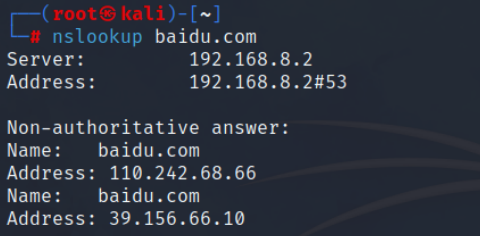
解释:
-
Server、Address:
本次查询的 DNS 服务器。可以自己指定。默认情况下 DNS 服务器的端口为 53。 -
Non-authoritative answer(非权威应答):
说明回答来自其他服务器的缓存,而不是权威 DNS 服务器。
示例 3.1-2:PTR 反向 DNS 解析。
nslookup -ty=ptr 8.8.8.8
结果:
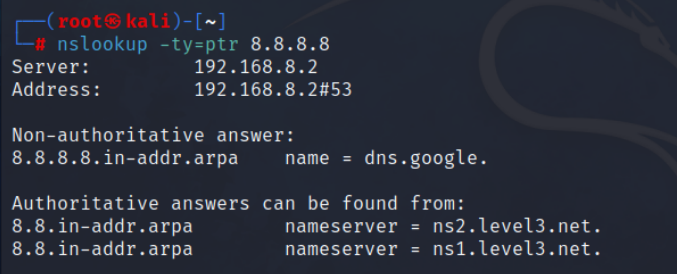
3.2:指定 DNS 服务器
基本语法:nslookup <target> <DNS server>
示例 3.2-1:指定服务器为 8.8.8.8。
nslookup google.com 8.8.8.8
结果:
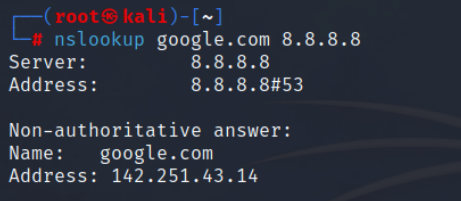
4:示例 - 交互模式
示例 4-1:查找权威服务器。
# 1、
nslookup
# 2、
set ty=NS
# 3、查看当前配置
set all
# 4、查找 baidu.com 对应的权威服务器
baidu.com
结果:
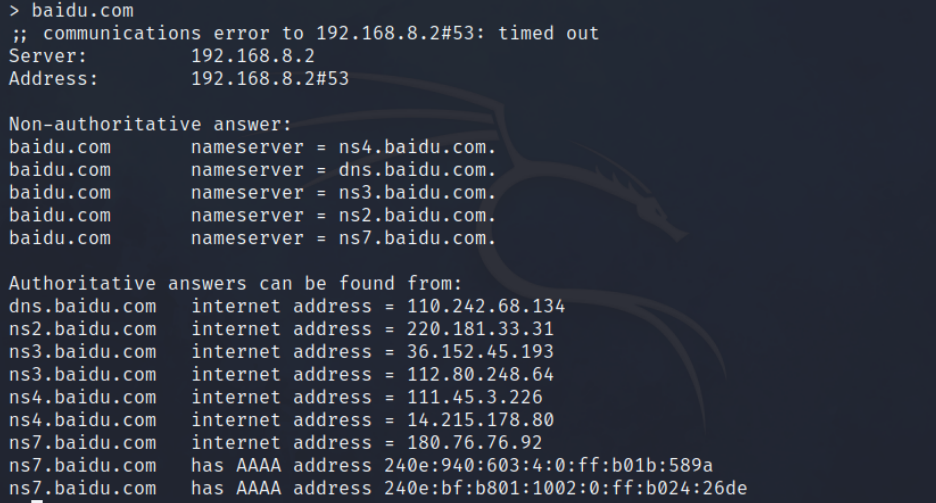
示例 4-2:指定 dns.baidu.com 作为 DNS 服务器对 baidu.com 执行 type=A 的查询。
# 1、
nslookup
# 2、
server dns.baidu.com
# 3、
set ty=A
# 4、
baidu.com
结果:
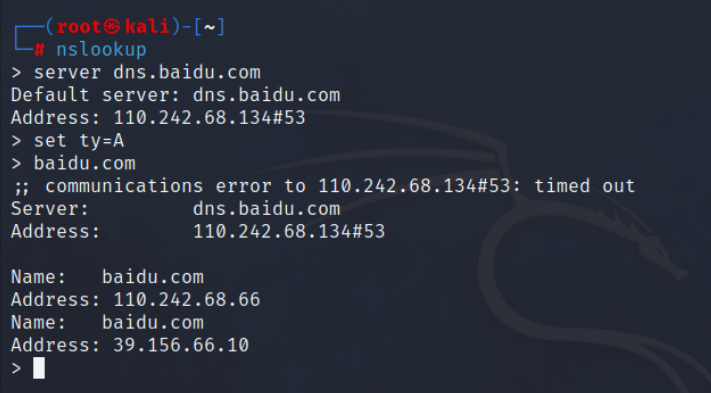
5:其他
DNS 记录:
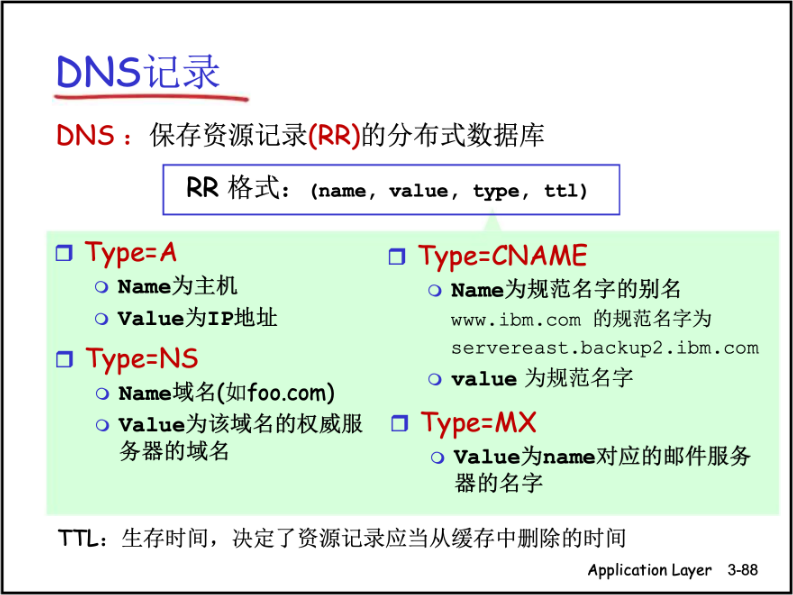
《10 most used Nslookup commands》:
https://www.cloudns.net/blog/10-most-used-nslookup-commands/
《nslookup命令详解》:
https://blog.csdn.net/xg_ren/article/details/80782338
兰生幽谷,不为莫服而不芳。舟在江海,不为莫乘而不浮。君子行义,不为莫知而止休。
——《淮南子》(西汉)刘安